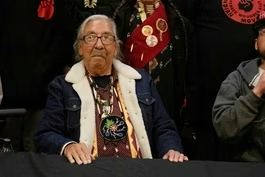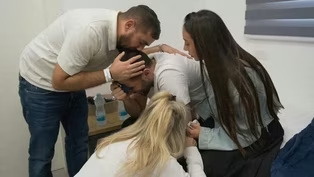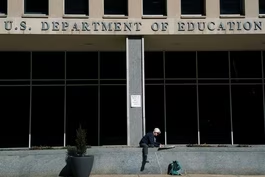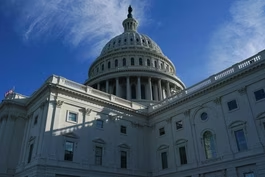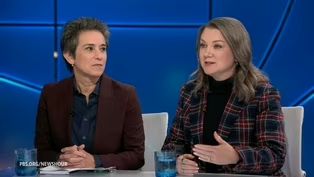
Experienced Mideast negotiators analyze Gaza peace deal
Clip: 10/13/2025 | 8m 18sVideo has Closed Captions
Experienced Mideast negotiators break down how Gaza peace deal came together
To discuss the peace agreement and the release of hostages and detainees, Amna Nawaz spoke with two people with extensive experience trying to negotiate peace between the Israelis and Palestinians. Dennis Ross had roles in the peace process for both Democratic and Republican administrations, and Rob Malley had high-level national security positions in the Clinton, Obama and Biden administrations.
Problems playing video? | Closed Captioning Feedback
Problems playing video? | Closed Captioning Feedback
Major corporate funding for the PBS News Hour is provided by BDO, BNSF, Consumer Cellular, American Cruise Lines, and Raymond James. Funding for the PBS NewsHour Weekend is provided by...

Experienced Mideast negotiators analyze Gaza peace deal
Clip: 10/13/2025 | 8m 18sVideo has Closed Captions
To discuss the peace agreement and the release of hostages and detainees, Amna Nawaz spoke with two people with extensive experience trying to negotiate peace between the Israelis and Palestinians. Dennis Ross had roles in the peace process for both Democratic and Republican administrations, and Rob Malley had high-level national security positions in the Clinton, Obama and Biden administrations.
Problems playing video? | Closed Captioning Feedback
How to Watch PBS News Hour
PBS News Hour is available to stream on pbs.org and the free PBS App, available on iPhone, Apple TV, Android TV, Android smartphones, Amazon Fire TV, Amazon Fire Tablet, Roku, Samsung Smart TV, and Vizio.
Providing Support for PBS.org
Learn Moreabout PBS online sponsorshipAMNA NAWAZ: For more on today's events, we turn to two people with extensive experience trying to negotiate peace between the Israelis and Palestinians.
Dennis Ross played leading roles in the Middle East peace process for both Democratic and Republican administrations.
He's now at the Washington Institute for Near East Policy.
That's a Washington think tank.
And Rob Malley had high level positions on the National Security Council staff in the Clinton, Obama and Biden administrations.
He's now senior fellow at Yale University.
Gentlemen, welcome to you both, and thank you for joining us.
Before we get to what comes next, I want to just put to each of you to answer briefly on how we got here.
Rob, start us off here.
Why do you think this president now was able to get done what his predecessor was not?
ROB MALLEY, Former U.S.
Special Envoy to Iran: Well, first, I mean, he put together a peace plan which is an eyesore.
I mean, it demands atonement for the Palestinians for what happened on the massacre of October 7.
It doesn't demand atonement for what -- Israel's barbaric war that followed.
It is -- calls for Gaza's deradicalization, but not for Israel's.
It micromanages the future of the Palestinian self-governance.
It doesn't say anything about the future of Israel's occupation.
It's riddled with ambiguities.
And yet, for all that, despite all that, it's a major achievement by the president.
And it was achieved, again, despite all the criticism that I just leveled, because he adopted a form of unconventional politics, where he just exercised raw power, was prepared to break convention.
He spoke to Hamas.
He put pressure on Israel.
He also gave guarantees to both sides.
And it was a form of politics that his predecessors simply were not able or willing to exert.
AMNA NAWAZ: Dennis Ross, do you agree with that?
In this case, Rob is saying that the man himself was more important than the plan.
DENNIS ROSS, Former U.S.
Envoy to Middle East: Well, I think, yes, I generally agree with what Rob said.
I would put it a little differently.
President Trump exercises leverage.
Leverage takes two forms.
One is incentives and inducements, and the other is penalties and consequences.
What he -- he put himself in a position where the prime minister of Israel could not say no to him.
But he also used the Arabs in a way that President Biden couldn't.
He put them in a position where basically they were also willing to be responsive to him, and they were not prepared to say no to him.
President Biden wasn't in a position to basically convince Bibi not to say no to him.
And one of the reasons that was the case is because Bibi always had the Republicans that he could use against a president.
So there was a context that was different, but he was prepared to use coercion and leverage in a way that went beyond what the Democratic president or Democratic administration was prepared to do.
AMNA NAWAZ: Rob Malley, do you feel that the previous government that -- under President Biden, did it have leverage that it didn't use?
Or is it also true that President Trump just had different circumstances that offered him more leverage, right?
Israel had already met a number of its goals.
Hamas was degraded.
They killed Hezbollah leaders in Lebanon.
They carried out joint U.S.
strikes against Iran.
Were the conditions more ripe for a deal?
ROB MALLEY: I think both statements are true.
Yes, the conditions were more ripe for a deal for all the reasons you gave and some of the reasons that Dennis gave.
But it is also true that the Biden administration -- and this is something that Biden administration officials are going to have to face and have to account for -- did not exercise the leverage that they possessed.
They had huge leverage with Israel.
President Biden was extremely popular with the Israeli public right after October 7, so he had that leverage, political leverage.
And, of course, they had the leverage of the provision of weapons.
You can't say that you're working tirelessly for a cease-fire and continue to provide the weapons that ensure that the fire continues.
That is simply inconsistent.
So, yes, they had the kind of leverage that, had they wanted to, they could have called Prime Minister Netanyahu out, which they didn't want to do.
They didn't want to take tough votes at the Security Council, and, most of all, they didn't want to withhold or condition the provision of weapons.
Again, I agree that President Trump faced more favorable circumstances, but there's a lot of leverage that the Biden administration had and they simply refused to exercise.
AMNA NAWAZ: Dennis Ross, there's also this approach by Steve Witkoff, Jared Kushner to reportedly meet directly with Hamas to make the case and make clear to them that President Trump wants peace here, to get Turkey and Egypt and Qatar to apply more pressure.
How different is that from previous efforts?
And does that in any way, looking forward, keep Hamas from breaking the cease-fire, somehow put Trump as a guarantor?
DENNIS ROSS: Well, it's an interesting point because historically no administration had been willing to meet with Hamas because they didn't want to legitimize them.
They didn't want to undercut the Palestinian Authority.
They didn't want to make Hamas the representative of the Palestinians.
This administration did not feel constrained that way.
And so they approached Hamas directly at the end.
But I'm not sure that was ultimately the key.
I think the real key here on the Arab side and also the Muslim side was being prepared to use the relationship with Turkey, President Erdogan, use the Qataris, use the Egyptians, make it clear to them how much they had to gain with President Trump, but also what they had to lose if they weren't helpful.
All of them decided it was in their interest to show President Trump how successful they could be and why he had a stake in them.
The Biden administration never quite did that.
And to be fair on the issue of the circumstances, the fact is those circumstances, in terms of what Israel had done to Hezbollah, that was done a year ago.
So many of the circumstances were there for some time.
Obviously, what happened in June with Iran also affected things.
But the reality is, the real weakening of the proxy network had taken place before that.
AMNA NAWAZ: Rob Malley, take a look at how the president was speaking about this deal today with a major summit, right, all the world's leaders gathered behind him there, and he's using language talking about the end of the war, talking about a new beginning.
Is he right?
ROB MALLEY: I mean, the end of the war in Gaza, if he achieves that, again, that's a momentous achievement.
I think, beyond that, it's typical Trump hyperbole.
This is not the end of the conflict, not even the end of the conflict in Gaza, let alone the end of the conflict between Israelis and Palestinians.
I think the lesson here is that it's going to take a president, whether it's President Trump or a future president, to use an unconventional form of politics, a politics that is immune from the laws of political gravity in the U.S.
and is prepared to take steps that may not be popular, that may not be traditional, that may not be typical.
But, for example, engaging with Hamas, that is something that, as Dennis said, prior presidents didn't want to do.
But it was simply a recognition of reality.
How do you make peace in Gaza if you don't talk to the party that holds the key to war and peace?
It may not be pretty, but it's essential.
President Trump did that.
I would be far from predicting now that we're on the verge, on the cusp of Israeli-Palestinian peace.
One step at a time.
I think, for Gazans today, this is -- they're going from an utter hell to a mere nightmare, and that's progress for them.
We have seen the joy of the families that are getting the hostages, the Palestinian detainees who are back.
We're hoping that humanitarian aid is going to go back into Gaza.
Again, that's achievement enough.
I think it's going to take some time to get to the next phase, let alone Israeli-Palestinian peace.
AMNA NAWAZ: Dennis Ross, in the minute or so we have left, what are you watching in the days, weeks ahead to see if this cease-fire does hold?
DENNIS ROSS: It is going to be President Trump's direct involvement, his team's direct involvement, filling out that team with more.
You have 20 points.
I think every single point is interpreted differently by the parties, and the linkage between demilitarization and withdrawal is a key one.
How is it defined?
Who's going to carry it out?
That's what I'm going to watching for.
AMNA NAWAZ: A big first step, big questions, as you both say, ahead.
Dennis Ross, Rob Malley, thank you both for your time.
ROB MALLEY: Thank you.
Indigenous activist Leonard Peltier on life after prison
Video has Closed Captions
Clip: 10/13/2025 | 9m 6s | Indigenous activist Leonard Peltier on adjusting to life at home after decades in prison (9m 6s)
Israeli hostages freed after 2 years of brutal war
Video has Closed Captions
Clip: 10/13/2025 | 8m 36s | Israeli hostages freed and Palestinian detainees released after 2 years of brutal war (8m 36s)
News Wrap: Nor’easter slams East Coast
Video has Closed Captions
Clip: 10/13/2025 | 5m 24s | News Wrap: Nor’easter slams East Coast (5m 24s)
Shutdown firings hollow out special education office
Video has Closed Captions
Clip: 10/13/2025 | 5m 30s | Trump's shutdown firings hollow out special education office (5m 30s)
Speaker says U.S. 'barreling toward' prolonged shutdown
Video has Closed Captions
Clip: 10/13/2025 | 4m 10s | Speaker says U.S. 'barreling toward' prolonged shutdown as ripple effects grow (4m 10s)
Tamara Keith and Amy Walter on peace deal's political impact
Video has Closed Captions
Clip: 10/13/2025 | 10m 2s | Tamara Keith and Amy Walter on the Gaza peace deal's political impact (10m 2s)
Providing Support for PBS.org
Learn Moreabout PBS online sponsorship
- News and Public Affairs

FRONTLINE is investigative journalism that questions, explains and changes our world.

- News and Public Affairs

Amanpour and Company features conversations with leaders and decision makers.












Support for PBS provided by:
Major corporate funding for the PBS News Hour is provided by BDO, BNSF, Consumer Cellular, American Cruise Lines, and Raymond James. Funding for the PBS NewsHour Weekend is provided by...
